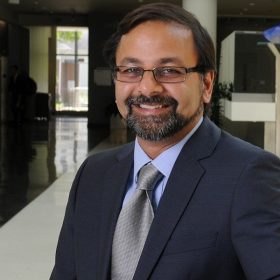Elon Law students participated in an Oct. 20 roundtable on public surveillance that included a presentation by Deven Desai, associate professor of law and ethics at the Georgia Institute of Technology Scheller College of Business.

The Elon Law students involved in the roundtable are externs, earning academic credit for supervised legal work in the police and city attorney’s offices of Greensboro, North Carolina.
The roundtable discussion focused initially on new technology that allows law enforcement and intelligence agencies to obtain a multitude of information about citizens by using backward looking surveillance, rather than forward looking surveillance. Forward looking surveillance includes things like wiretapping to find out what someone will say, or having an officer in a car follow a suspect to find out where someone will go. On the other hand, new technology has allowed backward surveillance, which involves things like the mass collection of cell phone data—including the program being used by the NSA, Prism—as well as data collection of citizens’ Internet activity. In his article, “Constitutional Limits on Surveillance: Associational Freedoms in the Age of Data Hoarding,” Desai advances the idea that this emphasis on backward looking surveillance allows law enforcement to collect a “data hoard” for each person that may be continually used to investigate citizens with little to no oversight. He sees this as a harm against the associational freedoms protected by the First and Fourth Amendments of the United States Constitution.
Roundtable participants included Greensboro City Attorney Tom Carruthers and Greensboro Police Attorney Jim Clark. Josh Berggrun L’16, an extern at the city attorney’s office, noted it was valuable to have at the roundtable those responsible for creating and drafting policies in the areas of law discussed at the forum.
Public surveillance has been a pervasive and persistent issue for the City of Greensboro in recent months, since the implementation of body-worn-cameras for the city’s police force. Now, each and every police officer for the City of Greensboro is required to wear a body-worn camera on their person while on duty. The cameras do not record everything the officer does constantly, but rather, when the officer begins an interaction with a citizen, he or she presses a button on the camera that begins recording video and audio at that moment, as well as capturing the previous thirty seconds prior to the officer pressing the button, minus the audio.
“The city of Greensboro has one of the most well-know and developed policies regarding body-worn-cameras,” said Berggrun.
Given the issue’s prevalence in our city, as one of the only cities in the country to have implemented such new technology, the opportunity to discuss this matter with Desai, Carruthers and Clark was invaluable. The crux of the issue is whether or not the public has a right to see the footage that is captured on the police officers’ body-worn-cameras, or whether the footage is a personnel record that is not subject to the public’s discretion. Implicated in this debate are many different privacy concerns–those of victims who may be captured on film getting hurt, those of witnesses, suspects, and even innocent bystanders. Laura Milloway L’16, an extern in the city attorney’s office, stated her interest was sparked in “what happens when officers pick up the conversations of innocent bystanders who may have felt that their conversations were private.”
Cecelia Jones L’15, an extern working in the police attorney’s office, said, “it is apparent that technology has lapped the legislative process, and our legislature now has some major work to do.”
Patrick Collins L’15, an extern working in the police attorney’s office, summed up the intersection of Desai’s scholarship and the city’s use of new surveillance technology.
“Professor Desai’s interest is in data storage and the ability of government agencies to hoard data and later search it at their convenience,” Collins said. “The city’s interests are more about what to do with disclosing the data it already has in the form of body-worn-camera footage and surveillance cameras. The discussion seemed to be beneficial to the city in looking forward to data security where the city’s data is stored with a third party server.”
Before joining the faculty at the Georgia Institute of Technology, Desai was an Associate Professor of Law at the Thomas Jefferson School of Law in San Diego. He worked at Google, Inc., as that corporation’s first Academic Research Counsel, with duties that included expanding Google’s research from the legal and sociological perspectives. Desai attended the University of California at Berkeley as well as Yale Law School.
Article authored by Hayley Sherman L’15


